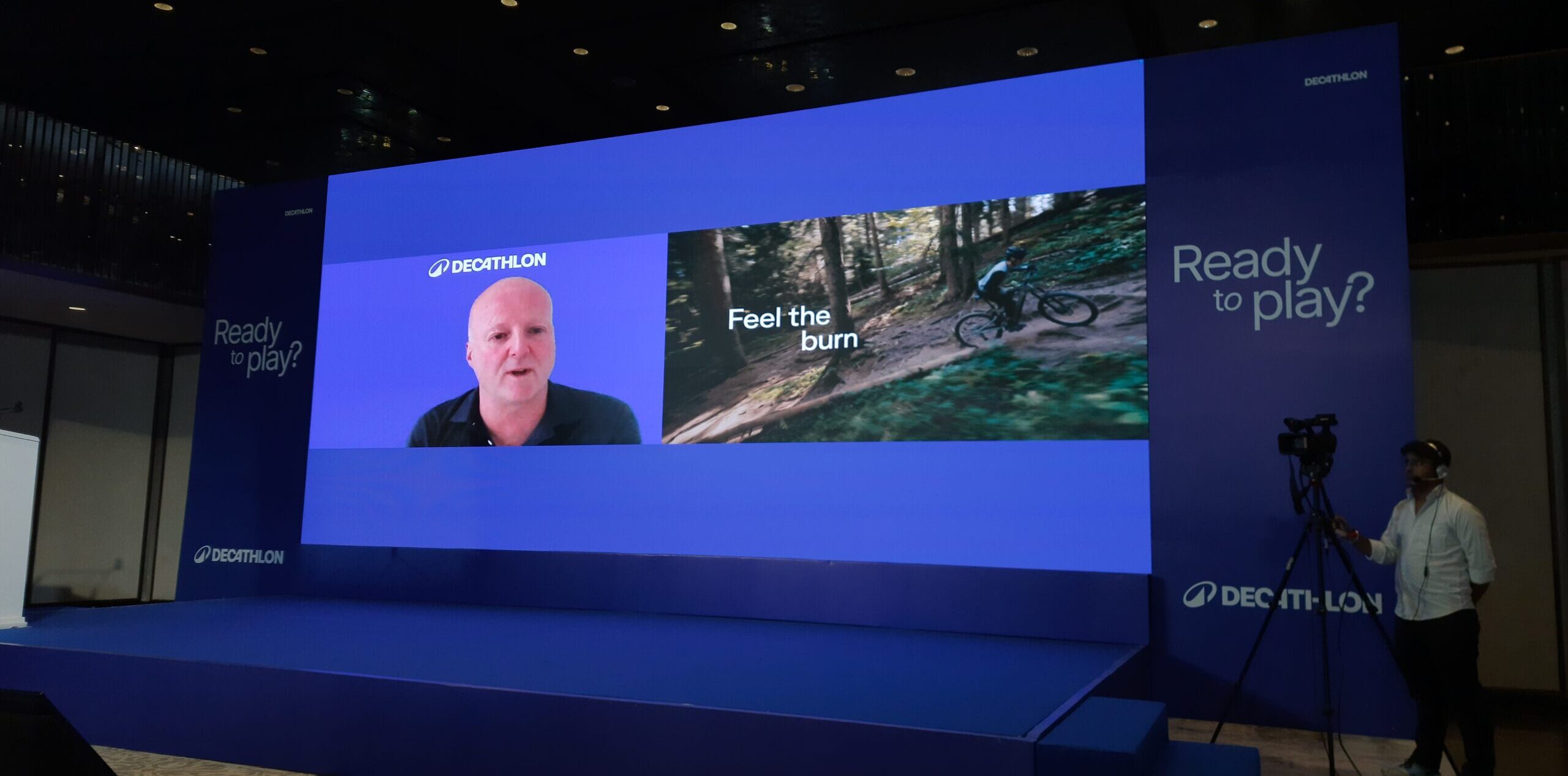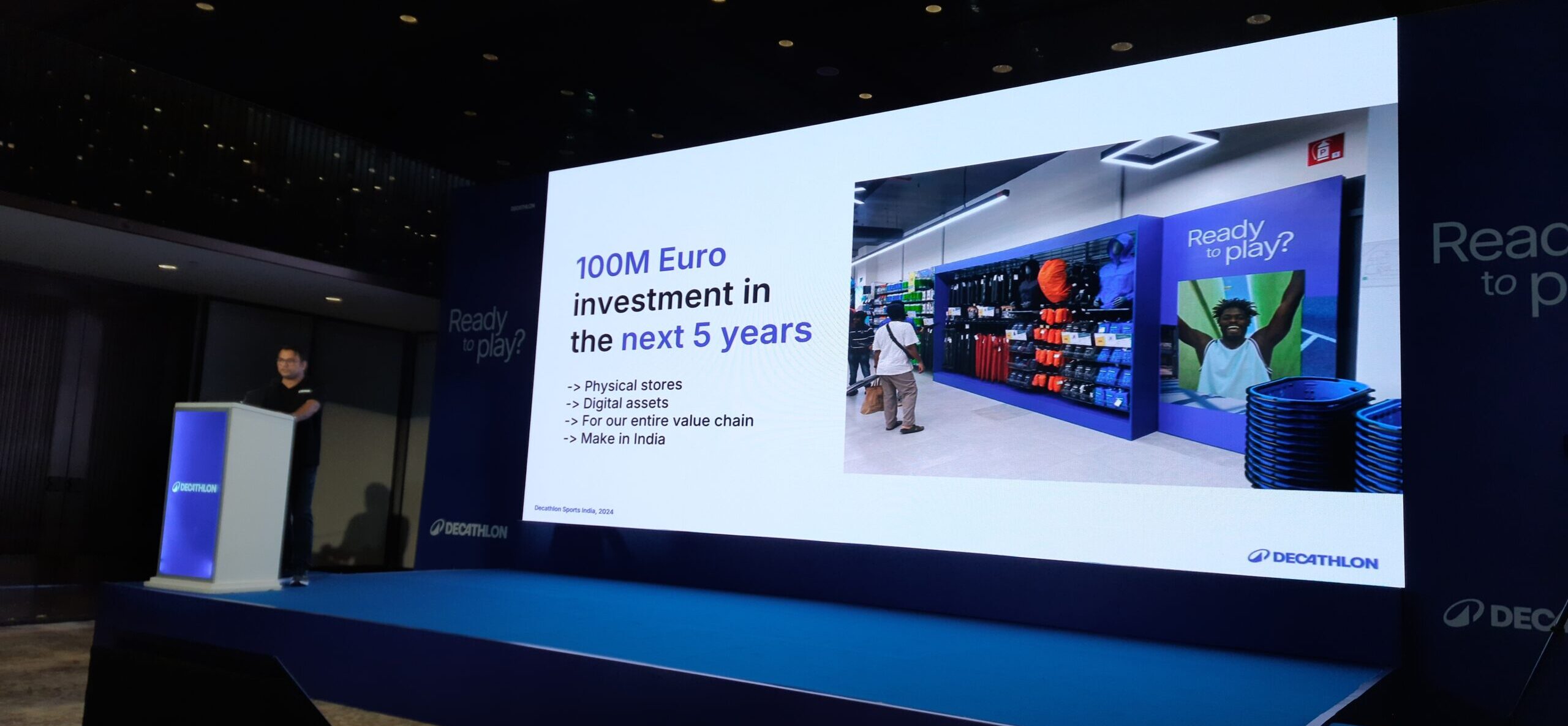Sankar Chatterjee, chief executive officer, of Decathlon Sports India sheds light on the French sports retailer’s take on elevating the customer experience with the right technology and e-commerce strategy
New Delhi: Leading French sports retailer Decathlon is significantly advancing its technology integration, enhancing both physical and digital shopping experiences, the company’s top executives including Steve Dykes, chief business and counties officer and Sankar Chatterjee, Chief Executive Officer (CEO), Decathlon India told IndiaRetailing.
The retailer’s omnichannel strategy aims to seamlessly blend physical and online shopping, allowing features like product pick-up, in-store events, and efficient delivery networks. This comprehensive approach is designed to provide a fully integrated shopping journey, reflecting a strong commitment to both in-store and digital advancements.

Decathlon will invest €100 million (Rs 930 crore) in India over the next five years to expand its presence. The funds will support new stores, digital upgrades, and value chain improvements. The retailer aims to increase its store count to 190 across 90 cities, including tier 1 and tier 2 towns.
In an exclusive interview with IndiaRetailing, Sankar Chatterjee, chief executive officer, of Decathlon Sports India sheds light on the French sports retailer’s take on elevating the customer experience with the right technology and e-commerce strategy
Edited Excerpts
What’s new on the technology table?
We’re making substantial investments in technology to enhance both our physical and digital retail experiences. Our focus includes RFID for efficient self-checkouts, and we’re also streamlining the checkout process through our app and website for quicker, more personalized service. This integration is crucial for a seamless omnichannel experience.
On the physical side, we’re improving store operations to align with digital advancements, such as enabling product pick-up, hosting in-store events, and facilitating fast deliveries through a network of stores and warehouses.
In e-commerce, we’re investing heavily in our digital assets, including our website and app, to support faster checkout processes and personalized shopping experiences. We’re also exploring how local influencers and community-based initiatives can enhance our customer engagement.
Overall, our technology investments are designed to create a fully integrated and convenient shopping journey, blending the best of both online and offline channels.
What’s new in Artificial Intelligence and Machine Learning?
Before becoming CEO, I led our digital strategy, so I understand the importance of personalization in customer experience. For instance, if I’m a football player using our app, I expect to see football-related content, not something irrelevant like fishing. If I’ve purchased intermediate football shoes, I want recommendations that help me progress to the next level. Our AI focuses on delivering this kind of personalization, making shopping faster and more convenient. Whether through efficient search or tailored recommendations, we’re enhancing both in-store and online experiences. Generative AI also plays a role, integrating customer engagement with their shopping experience to offer the most relevant products and content.
What’s new in e-commerce, and are there any specific retention strategies you’re adopting?

We have loyal customers who frequently return to our platform because they need to keep practising sports. Our retention strategy hinges on two key aspects: exceptional customer experience and product quality. For example, we’re extending after-sales services like doorstep bicycle maintenance, even in tier 2 and 3 areas, to meet customer expectations. Additionally, we ensure our products evolve with the customer’s skill level, offering timely recommendations for upgrades. High-quality products that last, combined with these personalized services, form the core of our retention strategy. Marketing then amplifies this foundation to enhance overall retention.
Do you focus more on customer acquisition or retention?
It depends on the city. In established markets like Delhi, where we have a large and loyal customer base, retention naturally takes precedence. However, in new or emerging markets, such as when we recently opened a store in Jamshedpur, the focus is on acquisition. The goal is to achieve a balance between both. In newer cities, acquisition will dominate for the first few years, but as the market matures, retention becomes more critical. It’s about understanding the local dynamics and adjusting our approach accordingly.
Do you see digital literacy as a challenge when entering tier 2 and beyond markets?
Digital transformation is essential, and our company fully embraces it across all levels, from leadership to on-ground teams. This transformation has been ongoing for the past five to six years and is seen as a continuous journey rather than a finished line. While digital adoption is more straightforward in tier 1 cities, it can be slower in other geographies. However, our digital transformation team is dedicated to ongoing education and upskilling, ensuring that everyone, including leadership, stays informed about new technologies like AI and ML. We constantly push to improve digital literacy and adoption across all markets.
What new in-store technologies are you focusing on, and how are you ensuring that your employees are properly trained to use them?
We’re heavily investing in Learning and Development (L&D) to ensure our employees understand and effectively use new in-store technologies. For instance, RFID technology plays a crucial role in our operations, from traceability in manufacturing to self-checkout systems. Our L&D team, including digital reference experts, works across multiple locations to gradually enhance training. While adopting new technologies like RFID isn’t always easy, our team’s understanding and efficiency have significantly improved over the past five years. We’re confident that in another five years, our technological capabilities and employee expertise will be even more advanced.
How effective are self-checkouts, and are customers finding them easy to use?
Self-checkouts have been well-received by customers, especially because they save time and provide privacy. Customers appreciate the convenience of scanning their items, entering their information, and paying via UPI or card without waiting in long queues. Additionally, our app allows for scan-and-pay in-store, enabling customers to quickly complete their purchase and exit, which is particularly useful during busy weekends. We’ve seen positive feedback, as it enhances the post-purchase experience by offering multiple, reliable options for checkout. This flexibility ensures that the system remains robust and customer-friendly. Absolutely. It’s a key part of the overall customer experience, and great experiences naturally lead to higher retention.
What is the current split between online and offline sales?
About 11-12% of our sales come from direct-to-consumer (D2C) online channels. Of these online sales, over 75% are made through our mobile application, reflecting a clear shift towards mobile shopping on both Android and iOS platforms.
How many app downloads have you achieved?
We’ve achieved over 23 million downloads across both Android and iOS.
Given the massive data involved, how do you manage and secure it?
We have a dedicated team focused on business intelligence and data management. Additionally, we prioritize data privacy and security with robust IT security measures. This specialized team ensures that all data is handled securely and efficiently. We take data management and security very seriously. We have a dedicated business intelligence team and strong governance under our United CDO that ensures strict adherence to data privacy standards. This is a global effort, not just local, and it falls under the direct supervision of our governance structure. We prioritize data security with zero tolerance for breaches, and we’re proud to say we’ve never experienced one. Our approach includes encryption, investment in the latest technologies, and a strong focus on customer safety. This careful attention sometimes means taking longer to launch features, but it ensures that everything is secure and compliant.
Are there any plans for franchise-based stores in India, or in the future?
No, we are not considering franchise-based stores. We are committed to operating company-owned stores, and that’s how we plan to continue.


